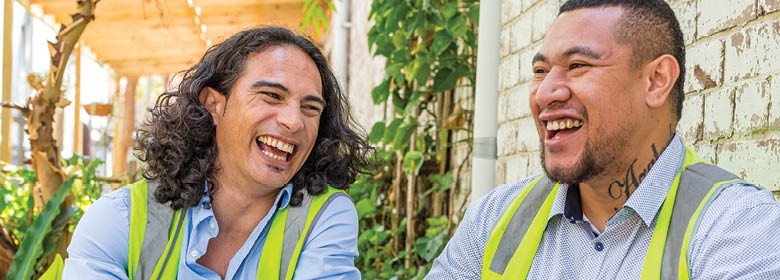A builder’s guide to managing anxiety
Running a building business is no walk in the park; long hours, tight deadlines, the management of sub-contractors, extreme weather and juggling the balls of business management. It can wear you down at times. As an industry, it’s not uncommon to dismiss our feelings when things get tough, often telling each other – or ourselves – to ‘take a spoon full of cement’ or to ‘man up’.
But this attitude is not helpful for our mental health. Why? Because suicide rates in the Australian building and construction industry are among the highest in the country. One construction worker is lost to suicide every second day, according to MATES in Construction – a charity set up specifically to drive suicide prevention initiatives across the Australian building and construction sector.
In our last edition of Trademark, we discussed how you can support the mental health of your team. In this issue, we are shining a light on anxiety, and how it may be secretly affecting you.
What is anxiety?
Anxiety is a normal emotion and a common mental health condition. One in four people will experience anxiety at some stage of their lives. It can appear at the time of a stress-causing event, like when you’re facing a tight deadline, or it can appear when there isn’t a noticeable cause.
Whilst anxiety is common, if left unchecked, it can be detrimental to your work and social life, so it’s important to look out for signs and symptoms.
Symptoms of anxiety
Anxiety can be a fleeting emotion, but if it lingers for an extended period once the cause of the stress is removed, or if there is no specific cause, then it might be that you have an anxiety disorder.
There are a few common symptoms that you should keep an eye out for: feeling nervous, restless or tense; having a sense of impending danger, panic or doom; increased heart rate; and rapid breathing.
Causes of anxiety
There’s no one cause for anxiety. It can be triggered by a combination of factors. You can be born this way, or your personal life, relationship issues, financial concerns and life events, such as losing a loved one, can trigger symptoms.
Workplace factors, such as long hours, job insecurity and conflicts with clients, suppliers and sub-contractors, can also play a part. Everyone’s under the same pressure, so conflict is more likely in times of stress across an industry like ours. If you’re struggling with anxiety, you may find yourself taking an unusual amount of time off or struggling to find the motivation to go to work like you normally do.
Anxiety symptoms can also be the first indicators of a medical illness, such as heart disease, diabetes and thyroid problems. Your doctor will likely send you for tests if they suspect a medical condition is behind your anxiety.
Exercise and anxiety
Exercise can help ease the symptoms of anxiety. Research has shown that just 30 minutes of exercise three to five days a week can make a real difference. It can help clear your mind, decrease muscle tension and release feel-good endorphins.
What’s more, according to the Calm Clinic, there’s a correlation between physical inactivity and anxiety symptoms where those who don’t burn off enough energy are more prone to suffering from anxiety.
Mindful breathing
Mindful breathing may sound like a fad, but it works. All you need is the quiet cabin of your ute or a walk during a break from work.
Mindful breathing focuses on bringing your attention to the present and preventing your mind from drifting off. Try this by repeating a calming sound – either a word or a phrase, like “breathing in, breathing out” – whilst gently inhaling and exhaling.
The 3-3-3 technique
Another great technique to try on the building site is 3-3-3. When you’re feeling anxious, take a look around you, name three things you see, three sounds you hear and move three parts of your body. This can centre your mind and bring you back into the present moment.
Finding more help
If anxiety is starting to affect you, or if it isn’t showing signs of easing, it’s important to find help. Reaching out to a general practitioner is a good first step. They can connect you with psychiatrists, psychologists and counsellors who are trained to provide help for anxiety. If you or someone close to you is in immediate danger, dial 000.
For further support, you can contact:
Beyond Blue
1300 224 636
ARCVic
1300 269 438
MATES in Construction
1300 642 111
HALT
0409 756 274
Emergency services
000


